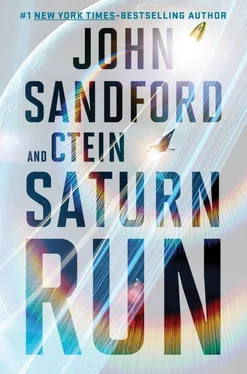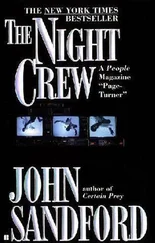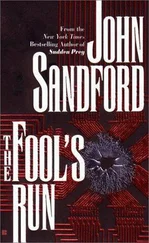Time’s up.
Sandy downloaded the files and ran them through the comparator. The new Chuck’s Eye image showed the same anomaly, same weird-ass spectra, not quite where the computer had projected it would be, but close enough for the Medium Eye to catch it. He pulled up those frames, superimposed them, centered on the anomaly at maximum magnification, and,
There. It. Fucking. Was.
Three little dots in a row. If this was an instrumentation glitch, then both telescopes were hallucinating exactly the same way.
Sandy punched in a new group of commands: calculate the current deceleration rate and position, combine it with those from three hours earlier, extrapolate an orbit.
EXTRAPOLATION: THE OBJECT WILL ACHIEVE SATURN ORBIT IN 13 HOURS.
The supervisory working group was meeting to argue about targeting priorities, when Sandy knocked on the door and stuck his head in. McGill was up at the whiteboard, writing down lines of mathematical symbols. He caught the words “synchrotron radiation” and “anomalous jets.” Whatever that meant—whatever it was, it seemed to impress the working group. As they turned from the whiteboard to look at Sandy, Fletcher rolled his eyes back into his skull. Then, with an effort, he controlled the reaction and said, with poorly concealed impatience, “What is it, Sanders?”
Sandy, knowing precisely how much he’d begun to irritate Fletcher, put on his best toothy smile and asked, “How’s it going, big guy?”
Fletcher ground his teeth. “I’m in a meeting here, Sanders, as you can see. If you could come back in an hour, or maybe tomorrow…”
“The computer found a critical anomaly in Chuck’s Eye and Medium Eye images,” Sandy said. “I thought I should tell you before I called the LA Times .”
In the momentary silence, one of the postdocs said to Fletcher, “He’s looking at the test images from the vibe fix.”
Fletcher muttered something to himself, which might have included the word “prick,” and asked Sandy, “Well, Sanders… did you get a report?”
Sandy peered at the piece of paper in his hand, as if he were having trouble reading it, and said, “The computer said there’s a critical anomaly. It says there is an object approaching Saturn, that it is real, that it is kilometers long and across, that its spectra is UV-rich-hot, and that it is emitting hydrogen.”
Slight pause for effect; Sandy knew he was now the center of attention and didn’t mind milking it for another fraction of a second.
“Oh yeah, it’s decelerating, and it will achieve Saturn orbit in thirteen hours.”
The Real Scientists all looked at each other, and then Fletcher said, “Give me that paper.”
A minute later, he said, “We need to run a confirming series.”
“Done that,” Sandy said, holding up a second sheet.
Fletcher looked even more annoyed, started to snap out something, and thought better of it. He took a deep breath. “Okay, and what did that tell us?”
Sandy handed him the second sheet of paper.
The working group stampeded down the length of the table to crowd behind Fletcher’s rounded shoulders, as they all read the paper together. After a minute, somebody said, “Sweet bleedin’ Jesus.”
Fifteen hours later, Fletcher, exhausted from hyperactivity and lack of sleep, scrubbed his balding pate with his fingernails, looked around at the others in the room—the working group plus a couple of Astro Ultra Stars, plus a thin, dark-eyed man from Washington who had managed to scare the shit out of everybody in Astro—and said, “So, what we’re saying is… Sanders Heacock Darlington made the most important scientific discovery in history? That asshole?”
“He couldn’t change a fuckin’ tire,” somebody said.
“Maybe not,” said the man from Washington, who scared them all. “But he found an alien starship.”
President Amanda Santeros tapped her pen, rapidly and unconsciously, against her teeth, as she skimmed the executive summary. She was a thin woman, narrow-shouldered with expertly coiffed dark brown hair. She wore a blue suit and a gold necklace with small turquoise cabochons, a gesture toward her home state of New Mexico. A hint of Chanel No. 5 hung about her, barely discernible through the odors of the waxes and cleaners that kept the Oval Office spotless, sanitary, and bug-free.
There were eight people with her: Senator Anson Sweet, the Senate Majority Leader; Representative Frances Cline, the Speaker of the House; Admiral Paula White and General Richard Emery, the chairwoman and vice chairman of the Joint Chiefs of Staff; Gene Lossness, director of DARPA; Jacob Vintner, her chief science adviser; and Ed Fletcher, of the Caltech Astrophysics Working Group, who’d arrived in Washington from Pasadena an hour earlier on a private hopjet, accompanied by the thin, dark-eyed man.
The man was named Crow. He didn’t sit next to Fletcher. He didn’t sit next to anybody. The President looked at her science adviser and said, “Jacob: an alien starship? I mean, really?”
Vintner, a fat man with a shiny bald head and small blue eyes, was more than a little nervous. He’d known Santeros since she was in college, had mentored her since graduate school, had been her official science adviser and unofficial confidante throughout her political ascent. It had all been interesting and some of it had been crucially important. None of it had been like this: he felt like a bit player in a bad sci-fi movie.
“We can’t think of what else it could be,” he said. “Once we had a trajectory for it, we looked at the Large Synoptic Survey database and tracked it back a few weeks. It’s gotta be from interstellar space. Our oldest photographs showed it already decelerating, with a residual velocity above one percent of c.”
“A little bit more in English?” That was White, the chairwoman. Good military mind, not so strong in physics.
“One percent of the speed of light. It was already slowing down two weeks ago,” Vintner said, “but was still traveling in excess of three thousand kilometers a second.”
White nodded: “So, basically, moving a hundred times faster than anything we’ve ever built. That doesn’t make it alien. I mean, we could build something that fast, right? Somebody could.” She meant China.
Lossness, the DARPA director, chimed in. “Yeah, but we couldn’t make anything very big. Takes a lot of energy to go that fast. This thing is kilometers in size. It’s like, ahh, a million times more massive than the biggest rocket we’ve ever built. It’s hundreds of times the size of an aircraft carrier.”
The President: “Nobody on Earth built that. We’d know about an industrial base that large.”
Lossness said, “That’s correct.”
Santeros turned to Fletcher: “You’re the guy who found this thing, right? What else do we know about it?”
Fletcher, both exhausted and ebullient, fidgeted a moment, rubbed his bald spot for good luck, and said, “My group of researchers discovered it. Actually, one of the grad students brought it to my attention. He was the one who found it first in some test photos from the Sky Survey Observatory.”
“Why isn’t he here?” Santeros asked. “Too busy for me?”
Fletcher shook his head. “No, ma’am. To be frank, he’s a kid who looks at a monitor and matches photos. He doesn’t know much about anything. He’s scientifically incompetent, personally irresponsible, and only got the job because his family is enormously rich—his father’s given Caltech a couple of buildings, and we’d like to get a couple more. The kid’s got a degree in art or something, and spends most of his time surfing and playing guitars. He wouldn’t have anything to contribute.”
Читать дальше








